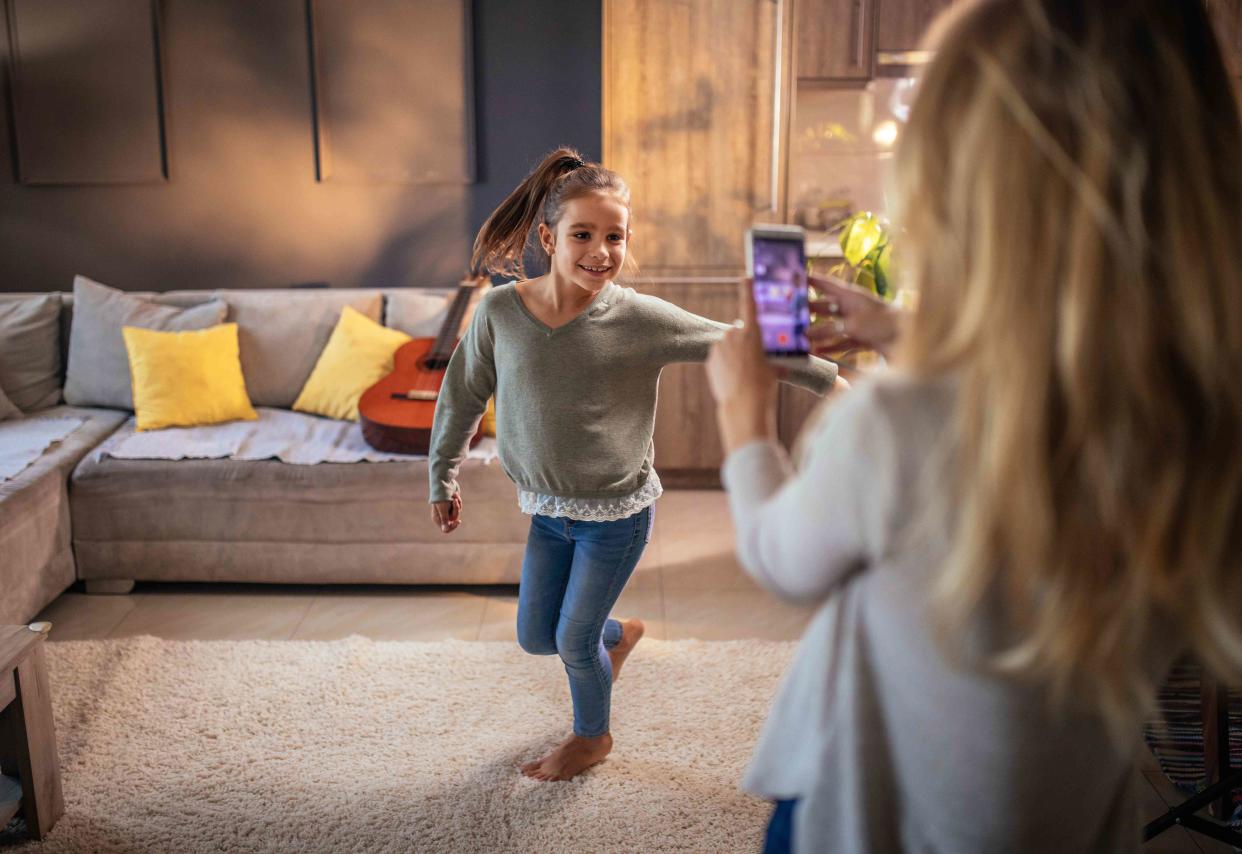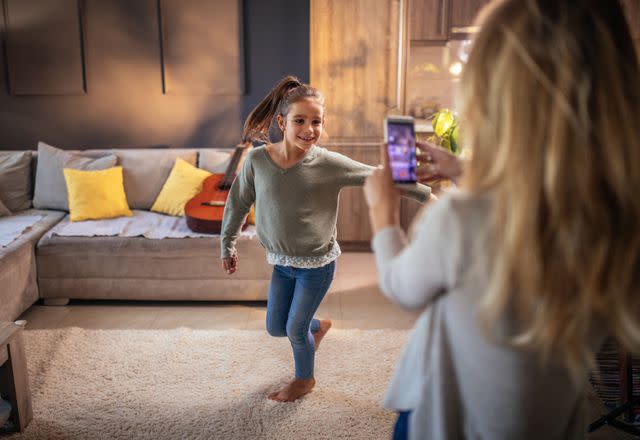The 5 Biggest Social Media Mistakes You're Making as a Parent

If you're guilty of 'sharenting' you're certainly not alone. While you may love posting every photo of your child, it could also pose a threat to their safety.

zeljkosantrac / Getty
Fact checked by Karen Cilli
My daughter Mila is 8 years old. She does not have any social media accounts of her own but her presence on Facebook and Instagram began when she was in utero. It was how my husband and I announced we were expecting and where we document milestones and memories such as birthday parties, epic tantrums, first and last days of school, and everything in between.
I'm not alone in this digital age phenomenon known as "sharenting." The humble bragging about our kids on social media is the easiest way to keep friends and family from all over the globe connected. But with safety concerns growing, data from a Norton poll shows that nearly 4 in 5 parents of minors (79%) say they have stopped sharing details about their child online because of safety concerns. With that said, 62% do not want their child's personal information or pictures of their kids online.
Kevin Roundy, the senior technical director, and researcher for Norton, a cyber safety brand of Gen understands the urge. "My wife and I get excited about our children's milestones and are eager to share them with friends and family through social media," he says. "What we often overlook is that the status updates, images, and videos we put out there, even if only meant for friends and family—have a permanent digital presence."
Roundy suggests parents ask themselves questions before they post. "...who will see what you share, what the goal of posting is, and whether you're comfortable with someone you don't know seeing the post. If any of these questions make you feel uneasy, it's best to not share."

zeljkosantrac / Getty
I got a wake-up call when Mila watched her idol, Jojo Siwa, make it to the finals on Dancing With the Stars and I couldn't resist documenting her reaction to the big moment. After much anticipation, Mila was inconsolable when JoJo lost and did NOT take home the Mirrorball trophy. I was relieved I'd captured her dramatic, over-the-top reaction—it was social media gold! I wondered if it would go viral. Maybe JoJo would see it and reach out to comfort my daughter.
But I never got to find out because as soon as Mila realized my phone was pointed at her, the crying turned into anger. "Stop filming me! Delete that!!" she yelled, followed by "You better not post it on Instagram!" Of course, I complied but I'd be lying if I said I never posted anything again without her consent. It did, however, make me think about what will happen when she's old enough to have her own social media accounts and sees all the things, unbeknownst to her, that I did post.
So, what mistakes are parents making when it comes to their kids and social media sharing? We went to the experts for a breakdown of what you may be doing wrong and why.
Related: Montana Becomes First State to Enact Total Ban on TikTok
You’re Not Discussing Social Media Safety in Your Home
Growing up in the digital age, our kids are more connected than ever. I can't tell you the number of times that my daughter has wowed my parents with a texting hack or iPad setting they didn't know existed.
Kim Allman, the head of corporate responsibility for Gen understands that even though this generation of kids probably knows their way around a tablet and understands the ins and outs of an iPhone better than we do, it's easy to forget that they still have a lot to learn when identifying the risks of social media. Don't mistake their savviness for the ability to make good decisions online.
"Opening a dialogue regarding privacy, security, identity, reputation, and what's appropriate and acceptable for their family on these platforms is highly recommended," says Allman.
Having visibility into your child's social media activity allows parents to come up with a set of house rules that set clear boundaries and expectations. Allman highly recommends parents leverage educational resources such as The Smart Talk, which Norton created in partnership with the National PTA to help facilitate these conversations around digital safety.
Related: What is Chroming? The Latest Social Media Trend Parents Need to Know About
You're Posting Photos That Reveal Personal Information
By posting photos of your children online, you could unknowingly be revealing a treasure trove of personal information, such as birthdates and locations, that online predators can use maliciously. A photo from the first or last day of school seems innocent enough—but if your child is in a uniform or holding a sign, it could give away the school they attend. Oversharing personal information online makes families vulnerable to a variety of harms.
Jill Murphy, the editor-in-chief of Common Sense Media, explains online predators can gather information about a child, monitor the families' activities, and potentially use the images in ways they were not intended to.
"It's also important to note that everything a parent posts online has information that is valuable to advertisers and data collectors," she says. "For example, posting a photo of a child identifies a user as someone who may be interested in baby products."
Related: PSA: Using These Popular Hashtags Could Put Your Kid in Danger
You're Posting Photos of Other Kids Without Permission
It's incredibly important to be mindful of showing other kids in your posts, from school events, sports, or family reunions for example. Murphy says parents should always ask permission before posting another child on their social media accounts. If you're unsure in any way—better be safe than sorry and don't post, or crop the other child out of the photo.
You're Not Adjusting Privacy Settings
We've already established that exposing a child's personal information could pose significant risks to their safety and well-being. That's why it's of the utmost importance for parents to adjust the privacy settings of the social media platforms they use. Access should be limited to trusted individuals.
Make sure to take the time to look into the privacy features of the platform you want to share content on, as there are always new features being rolled out. "On Instagram, for example, not only can you make your profile private, but also you can select which followers can see or comment on your story and posts," says Roundy.
Roundy believes a good overall rule of thumb, before you press post, is to "make sure the content doesn't include information you wouldn't want a stranger to know." Hackers can leverage information to apply for credit services, or even steal your child's identity.
Related: Study Shows Social Media Can Add Stress to Parenting—Find a Community That Supports You
You're Posting Embarrassing Content
Yes, that video of your child melting down in Target or that photo of them naked and reading a book on the potty can seem too good not to post at the moment. But think about how your young kids might feel when they find it online ten years from now.
Roundy suggests making it common practice that all the content you're sharing about your life—especially posts that involve your kids— is positive. "Stay clear of negative posts—whether it be something your child might find embarrassing, or information or aspects of their life that would be deemed private," Roundy says. "Posting embarrassing or overly private aspects of your child's life on social media can negatively impact your relationship with them at home, potentially compromising their current or future trust in you as a parent. It can also put them in harm's way by opening a door to bullying from peers that see the content."
The Bottom Line
The bottom line—think before you post. There's nothing wrong with sharing your child's milestones with family and friends online, but make sure you are considering all of these factors first. Consider your child's safety, their digital footprint, and the wishes of other parents before posting.
Related: How Social Media Algorithms Hurt Black Girls
For more Parents news, make sure to sign up for our newsletter!
Read the original article on Parents.

